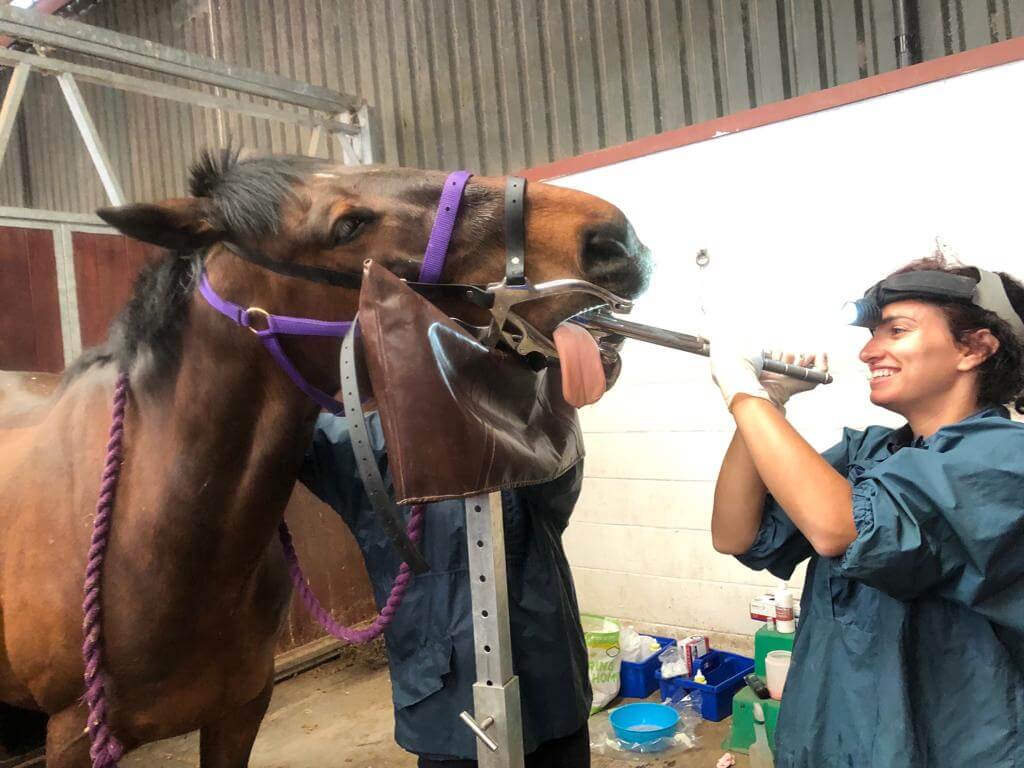Your horse’s mouth is a complex and sensitive structure, which needs to be looked after properly. Good dental health is necessary to allow a horse to eat efficiently and effectively grind food without pain or discomfort. Furthermore, a healthy mouth is necessary for good gut health, general health and overall wellbeing. Dental checks are part of a horse’s routine maintenance, just like worm testing and vaccinations. This blog article outlines some of the symptoms of dental problems to look out for.
Symptoms of Equine Dental Problems
There are several signs that could indicate a dental problem. These symptoms range from difficulty eating or poor performance or weight loss to absolutely nothing.
Difficulty Eating / Digestive Problems
Dental problems can cause pain and difficulty when eating, and this can lead to more serious problems such as choke, colic or diarrhoea. Horses need to be able to chew and grind food effectively to survive. Once the food leaves the mouth no further ‘chopping up’ of the food occurs. Signs to look out for include:
- Quidding – this is when the horse drops partially chewed often cigar shaped balls of hay
- Only chewing with one side of the mouth rather than swapping from side to side
- Pouching of feed in the cheeks
- Unchewed food and longer fibres of hay in droppings
- Dropping hard feed
- Reluctance to eat (particularly hay)
- Choke
- Weight loss
- Colic
Behavioural Changes
Pain and discomfort can cause a horse to behave differently. There may be subtle signs of resistance when being ridden, or more obvious problems such as rearing or general aggression. The following behavioural changes may be symptoms of a dental issue:
- Resistance to the bit and / or bridle
- Head tilting or tossing, open mouth, irregular head carriage
- Rearing, bolting, bucking and other dangerous behaviour
- Aggression
- Headshaking
- Depressive demeanour
Other Symptoms of Dental Problems
Aside from eating and behavioural problems, there are several other symptoms of dental problems. These may include:
- Facial swellings
- Inflammation of the gums
- Bad breath – this may be caused by decaying tissue or rotten food stuck in the mouth
- Discharge / smell from one or both nostrils
- Excessive salivation or drooling
The Importance of Regular Routine Dental Examinations for Horses
Whilst it is helpful to recognise the symptoms of a dental problem, as mentioned, it is also common for there to be no obvious symptoms. Therefore, it is essential to have your horse’s teeth examined regularly and rasped if required – usually every 12 months, but more often for horses under five, over fifteen or with specific abnormalities. This allows any issues to be identified and treated quickly, thereby minimising suffering and preventing a more serious issue from developing.
It is also important to note that many of the symptoms mentioned in this article could be attributed to other issues, such as poorly fitting tack, injuries, or back problems. Therefore, it is important to contact your vet, who will be able to carry out the appropriate investigations.
Avonvale Equine Vet Practice | Equine Dental Vets
At Avonvale Equine Vet Practice, our highly qualified equine dental vets are proud to provide both routine and advanced dental services. Our resident equine dental vet Laura Holmes (BVM&S Cert AVP(ED) MRCVS) passed her synoptic exam in Equine Dentistry last year as part of her certificate in Advanced Veterinary Practice (CertAVP). To achieve the specific Equine Dentistry postnominal, Laura had to complete all three modules in the Equine Dentistry subject area and pass a practical exam to be invited to sit the synoptic exam. The synoptic exam is a one-hour oral exam after 20 minutes of preparation of pre-reading and radiograph interpretation.
We are dedicated to bringing our clients the very best in equine veterinary care. This includes routine dental examinations, minor procedures and more complex extractions and sinus surgery. Register your horse, pony, donkey or mule with us today.








